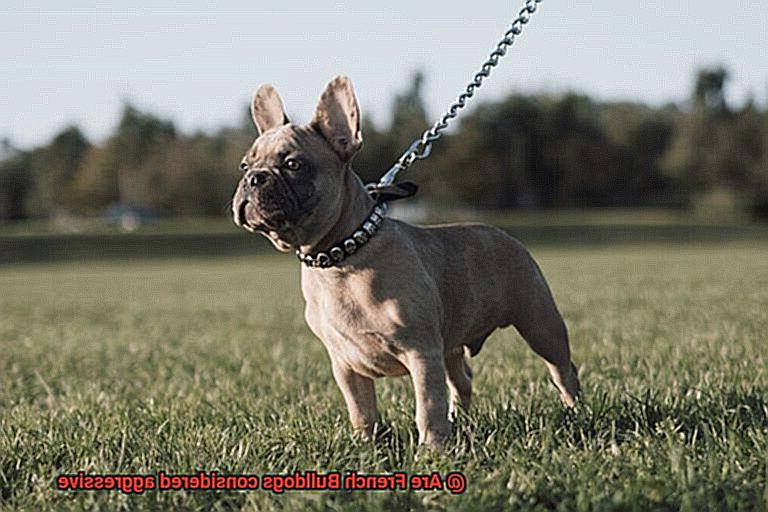Are French Bulldogs considered aggressive?
Prepare to embark on a journey through the world of French Bulldogs – those squishy-faced, bat-eared charmers that have stolen dog lovers’ hearts across the globe. Amidst the adoration and fanfare, a heated debate rages on: are French Bulldogs aggressive by nature?
Now, let’s take a step back and consider the casual perspective. Some may argue that these furry companions possess an inherent aggression. Perhaps they’ve encountered isolated incidents or heard tales from fellow dog owners who swear by their Frenchie’s feistiness. But hold your horses. Before we jump to conclusions, it’s important to remember that individual temperaments can vary greatly among all breeds, influenced by factors such as socialization, training, and genetics.
But wait. We’re not done yet. Let’s turn our attention to the professionals and breeders who vehemently oppose this notion of French Bulldog aggression. They champion the breed’s docility, affectionate nature, and knack for getting along swimmingly with children and other pets. These experts attribute any signs of aggression in French Bulldogs to improper training or a lack of essential socialization during their formative years.
So here we are, ready to dive headfirst into this question: are French Bulldogs truly aggressive? In this blog post, we’ll dig deep into both casual experiences and expert opinions to provide you with a comprehensive view of the truth behind this misconception. Our aim is simple – to uncover the real nature of French Bulldogs and empower dog enthusiasts like you with informed decisions about this beloved breed.
Remember though, while French Bulldogs were bred for companionship, it’s crucial to consider individual variations and experiences when evaluating any dog’s temperament.
So, buckle up and get ready for an enlightening exploration into the world of French Bulldog behavior.
The Genetics of French Bulldogs and Aggression
Contents
- 1 The Genetics of French Bulldogs and Aggression
- 2 Socialization: A Key Factor in Reducing Aggression in French Bulldogs
- 3 Training Your French Bulldog to Reduce Aggression
- 4 The Environment and Its Impact on a French Bulldog’s Behavior
- 5 Protective Behaviors Versus True Aggression in French Bulldogs
- 6 Signs of Potential Aggression in a French Bulldog
- 7 How to Address Potential Issues with Aggressive Behavior
- 8 Conclusion
French Bulldogs are beloved for their friendly and affectionate nature, but like any breed, there can be individual variations in behavior. In this blog post, we will explore the factors that may contribute to aggression in French Bulldogs, including genetics and the environment. By understanding these factors, owners can better manage and prevent aggressive behavior in their furry friends.
Genetics and Aggression:
While genetics can play a role in a dog’s temperament, it is important to note that aggression is not a breed-specific trait in French Bulldogs. The breed has been selectively bred for companionship, aiming to eliminate aggressive tendencies. However, genetic factors such as variations in the serotonin transporter gene (5-HTT) have been associated with aggression in dogs. Though research on French Bulldogs specifically is limited, it is essential to recognize that genetic predisposition alone does not determine aggression.
Environmental Factors:
The environment a French Bulldog grows up in plays a significant role in their behavior. Proper socialization from an early age is crucial in shaping their temperament and reducing the likelihood of aggression. Exposing them to various people, animals, and environments helps them become well-rounded and confident dogs.
Training and Positive Reinforcement:
Training is another vital factor in preventing aggression. Consistent and positive reinforcement-based training methods help establish boundaries and teach appropriate behavior. Basic obedience commands are invaluable tools for managing situations that might trigger aggression.
A Stable and Stimulating Environment:
A stable and secure home environment can greatly impact a French Bulldog’s behavior. Dogs that experience stress or instability may be more prone to aggression. Providing mental and physical stimulation through regular exercise, interactive toys, and a structured routine can contribute to a well-balanced and contented dog.
Differentiating Protective Behavior from Aggression:
It is important to differentiate between protective behaviors and true aggression in French Bulldogs. Protective instincts are natural and should not be punished. However, recognizing signs of true aggression, such as growling, snapping, or biting, is crucial in addressing and managing the behavior appropriately.
Socialization: A Key Factor in Reducing Aggression in French Bulldogs
French Bulldogs are known for their friendly and sociable nature, but like any other breed, they can exhibit aggressive behaviors if not properly socialized. Aggression in French Bulldogs can stem from fear, insecurity, territoriality, or a lack of exposure to different stimuli. However, by focusing on socialization, owners can help their French Bulldogs develop confidence, learn appropriate social skills, and reduce the likelihood of aggressive behavior.
Starting socialization early is crucial for French Bulldogs. During the puppyhood stage, dogs are more receptive to new experiences. This is the perfect time to introduce them to a variety of people, including children and strangers. By exposing them to different individuals, we can help them become comfortable and less likely to act aggressively towards unfamiliar people.
In addition to people, it is important to expose French Bulldogs to a range of environments. Taking them to parks, busy streets, and public places can help them adapt to new situations and reduce anxiety-related aggression. By gradually exposing them to different environments, owners can build their French Bulldog’s confidence and reduce the likelihood of aggressive behavior.
Properly supervised interactions with other dogs are also essential for socialization. By allowing French Bulldogs to interact with both familiar and unfamiliar dogs, we teach them how to communicate effectively and prevent aggressive responses during encounters with other animals. Training classes or obedience schools that focus on positive reinforcement techniques can provide structured socialization opportunities while also teaching basic commands and manners.
During the socialization process, patience and consistency are key. It may take time for French Bulldogs to adjust to new situations and overcome any fear or anxiety they may have. Regular socialization throughout their lives is essential to maintain their sociability and prevent the development of aggressive behaviors.
Training Your French Bulldog to Reduce Aggression
Aggression in French Bulldogs can be a concerning behavior, but with the right training techniques, it can be effectively managed and reduced. In this section, we will explore expert-level steps to help you train your French Bulldog to reduce aggression.
Establish Yourself as the Pack Leader
As with any dog, it is crucial to establish yourself as the pack leader. French Bulldogs are known for their strong-willed nature, so it is important for them to understand that you are in charge. This can be achieved through consistent training, setting boundaries, and reinforcing obedience commands such as sit, stay, and come.

Socialization is Key
Socialization plays a vital role in reducing aggression in French Bulldogs. Expose your dog to different people, animals, and environments from an early age. This helps them develop positive associations and confidence in various situations. Gradually introduce new experiences and ensure that each interaction is a positive one.
Leash Training for Better Control
Proper leash training is essential for managing your French Bulldog’s aggression. Teach them to walk politely on a leash without pulling or reacting aggressively towards other dogs or people. Use positive reinforcement techniques such as treats and praise to reward good behavior. This helps redirect their focus and reinforces positive associations with being on a leash.
Identify Triggers and Implement Desensitization
Identifying triggers that may cause your French Bulldog’s aggression is crucial. It could be certain people, animals, or specific situations that provoke their aggressive behavior. Once you have identified these triggers, you can work on desensitizing and counter-conditioning your dog. Gradually expose them to the triggers in a controlled environment while providing positive reinforcement for calm behavior.

Seek Professional Help if Needed
If your French Bulldog’s aggression persists despite your training efforts, it may be beneficial to seek professional help from a dog trainer or behaviorist. They can provide guidance tailored to your dog’s specific needs and help address any underlying issues causing the aggression.
Remember, training a French Bulldog to reduce aggression takes time and consistency. Be patient with your dog and focus on positive reinforcement techniques to encourage good behavior. With proper training and socialization, most French Bulldogs can overcome their aggressive tendencies and become well-behaved companions.
The Environment and Its Impact on a French Bulldog’s Behavior
Today, we’re diving into the fascinating world of how the environment can shape the behavior of our beloved furry friends. From the home environment to socialization opportunities and exposure to different stimuli, we’ll explore it all. So grab a cup of coffee, get cozy, and let’s get started.
The Home Environment:
Creating a calm and secure space for your French Bulldog is essential. Here are some tips to consider:
- Maintain a consistent routine to provide stability.
- Ensure your Frenchie has a cozy spot to retreat to when feeling overwhelmed.
- Exercise regularly to release pent-up energy and reduce anxiety.
- Provide mental stimulation through puzzle toys or treat-dispensing games.
Socialization Opportunities:
Socializing your French Bulldog from an early age sets the foundation for good behavior. Here’s what you need to know:
- Introduce your Frenchie to various people, animals, and environments.
- Arrange playdates with well-behaved dogs to encourage positive interactions.
- Enroll in puppy socialization classes or obedience training.
- Expose them to different settings like parks, cafes, or pet-friendly stores.
Exposure to Different Stimuli:
Exposing your French Bulldog to varied stimuli helps them become adaptable and less reactive. Consider the following:
- Introduce them to different sounds such as vacuum cleaners, doorbells, or thunderstorms.
- Expose them to various textures like grass, sand, or different types of flooring.
- Gradually introduce them to new experiences like car rides or elevators.
Quality of the Owner-Dog Relationship:
The bond between you and your Frenchie plays a significant role in their behavior. Here’s how you can strengthen that bond:
- Show love and affection through physical touch, praise, and playtime.
- Use positive reinforcement techniques during training sessions.
- Be patient and understanding with your Frenchie’s needs and emotions.
- Seek professional help if you encounter any behavioral challenges.
Other Environmental Factors:
Certain environmental elements can impact a French Bulldog’s behavior. Consider the following:
- Noise levels: Loud noises can induce stress and anxiety, leading to aggression. Provide a quiet space during noisy events or fireworks.
- Temperature extremes: French Bulldogs are sensitive to extreme heat or cold. Ensure they have a comfortable living environment.
- Living conditions: Crowded living spaces can frustrate your Frenchie, potentially resulting in aggressive behaviors. Provide enough space for them to move around comfortably.
Protective Behaviors Versus True Aggression in French Bulldogs
French Bulldogs are beloved for their friendly and affectionate nature. However, like any breed, they can display protective behaviors that might be mistaken for aggression. In this article, we will delve into the differences between these behaviors and true aggression in French Bulldogs. Understanding these distinctions is vital for creating a safe and harmonious environment for both your furry friend and your family.
Protective Behaviors:
- Definition: Protective behaviors are instinctual responses displayed by dogs, including French Bulldogs, when they perceive a threat to themselves or their loved ones.
Examples of protective behaviors in French Bulldogs:
- Barking: This is a common way for dogs to communicate their discomfort or alert others to potential danger.
- Growling: A warning sign that indicates the dog’s unease or attempt to establish personal space.
- Lunging: In some cases, a French Bulldog may move forward aggressively to deter or intimidate the perceived threat.
True Aggression:
- Definition: True aggression is characterized by intentional and unprovoked acts of violence towards humans or other animals.
- Poor socialization: Insufficient exposure to various environments, people, and animals can lead to fear-based aggression.
- Fear: Traumatic experiences or ongoing fear can trigger aggressive responses in French Bulldogs.
- Medical issues: Pain or discomfort can cause a normally docile dog to display aggressive behavior.
- Protective behaviors are triggered by specific situations or perceived threats, while true aggression may occur without any apparent provocation.
- Protective behaviors are typically short-lived and cease once the perceived threat has passed, whereas true aggression may escalate and persist.
- Body language cues can help differentiate between the two, such as a stiffened body and forward posture indicating aggression, versus a defensive posture and raised hackles during protective behaviors.
- Socialization and training: Early and positive socialization experiences can help French Bulldogs develop confidence and reduce the likelihood of aggression.
- Identifying triggers: Understanding what situations or stimuli provoke protective behaviors in your French Bulldog allows you to manage their environment effectively.
- Seeking professional help: If you suspect true aggression in your French Bulldog, consult a qualified dog behaviorist or trainer who can assess the situation and provide guidance tailored to your dog’s needs.
- Growling: One of the most common signs of potential aggression in French Bulldogs is growling. When a Frenchie starts growling, it is a clear indication that they are feeling threatened or uncomfortable. This can happen when they feel their personal space is being invaded or when they perceive a potential threat. It is essential not to ignore growling and to take immediate action to prevent any escalation.
- Snarling or showing teeth: Another sign to watch out for is snarling or showing teeth. When a French Bulldog snarls or bares its teeth, it is a clear warning sign that they are feeling aggressive and may be ready to defend themselves. This behavior can occur when they feel cornered or trapped, or when they perceive a threat towards themselves or their family.
- Aggressive stance: An aggressive stance is another indication of potential aggression in French Bulldogs. This can include stiffening of the body, raised hackles, and a tense posture. If your Frenchie adopts this posture while interacting with other dogs or people, it is important to intervene and remove them from the situation to prevent any potential harm.
- Snapping or biting behavior: Some French Bulldogs may display snapping or biting behavior as a form of aggression. This can happen when they feel threatened or if they have not been properly socialized. It is crucial to address this behavior immediately through training and socialization techniques to prevent any future incidents.
- Excessive barking: Excessive barking can also be a sign of potential aggression in French Bulldogs. While barking is a normal form of communication for dogs, if your Frenchie constantly barks at strangers, other animals, or even family members, it may be an indication of underlying aggression. This behavior should not be ignored and should be addressed through positive reinforcement training.
- Body language: Lastly, it is essential to pay attention to your Frenchie’s body language as a whole. Signs such as a tense body, raised tail, erect ears, and intense staring can all indicate potential aggression. Understanding and recognizing these cues can help prevent any aggressive incidents and allow you to take the appropriate action to diffuse the situation.
Factors contributing to aggression in French Bulldogs:

Differentiating between Protective Behaviors and True Aggression:
Prevention and Intervention:
Signs of Potential Aggression in a French Bulldog
French Bulldogs are known for their friendly and sociable nature, but like any breed, they can display signs of aggression under certain circumstances. It is important for owners to be aware of these signs to ensure the safety of both their dog and those around them. In this article, we will discuss the various indicators of potential aggression in French Bulldogs.
How to Address Potential Issues with Aggressive Behavior
French Bulldogs are known for their friendly and affectionate nature, making them popular companions. However, like any breed, French Bulldogs can exhibit aggressive behavior under certain circumstances. In this guide, we will explore how to address potential issues with aggression in French Bulldogs to ensure a happy and well-behaved companion.
Understanding the Root Cause:
Aggression in French Bulldogs can have various causes, including fear, territoriality, dominance, or even medical conditions. It is crucial to identify the underlying cause of aggression to address it effectively. Observing your dog’s body language and consulting with a professional dog trainer or behaviorist can help determine the root cause and develop a tailored plan.
Consistent and Positive Reinforcement Training:
Consistency is key when training your French Bulldog to address aggressive behavior. Positive reinforcement techniques, such as rewards, praise, and redirection, can encourage desired behaviors while discouraging aggression. Patience and consistency are vital during the training process.
The Importance of Socialization:
Early and ongoing socialization is essential for French Bulldogs to prevent fear-based aggression. Introducing them to various people, animals, and environments from a young age helps build their confidence and reduces the likelihood of aggression later in life. Gradual exposure and positive experiences are key.
Establishing Clear Boundaries:
Creating a structured environment with clear boundaries is crucial for managing aggressive tendencies in French Bulldogs. Dogs thrive when they know their place in the family hierarchy and understand what behavior is expected of them. Consistency in enforcing rules helps minimize stress or anxiety that may contribute to aggression.
Mental and Physical Stimulation:
Regular exercise, interactive toys, and training sessions provide mental and physical stimulation for French Bulldogs, helping alleviate pent-up energy that may contribute to aggression. Engaging their minds and bodies with stimulating activities reduces the likelihood of aggression.
Seek Professional Help if Needed:
If you are experiencing difficulties in addressing aggressive behavior in your French Bulldog, do not hesitate to seek professional help. Certified dog trainers or animal behaviorists can provide guidance tailored to your dog’s specific needs and develop a personalized training plan.
U9FfZtV10_Y” >
Conclusion
In conclusion, it can be said that French Bulldogs are not generally considered aggressive.
They are known for their friendly and affectionate nature, making them great companions for families and individuals alike. While any dog has the potential to display aggression if not properly trained or socialized, French Bulldogs are not typically prone to aggressive behavior.
With proper care, training, and socialization, these adorable dogs can make wonderful pets without posing a significant risk of aggression.




